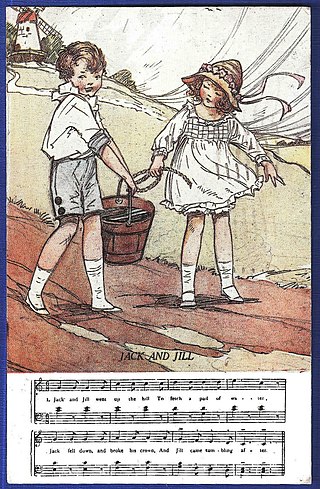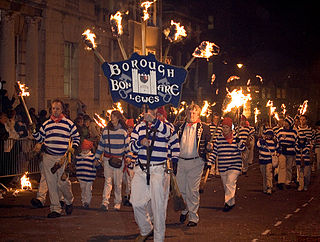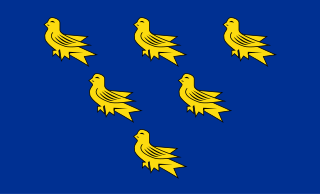
A proverb or an adage is a simple, traditional saying that expresses a perceived truth based on common sense or experience. Proverbs are often metaphorical and are an example of formulaic language. A proverbial phrase or a proverbial expression is a type of a conventional saying similar to proverbs and transmitted by oral tradition. The difference is that a proverb is a fixed expression, while a proverbial phrase permits alterations to fit the grammar of the context. Collectively, they form a genre of folklore.

Sussex is an area within South East England which was historically a kingdom and, later, a county. It includes the ceremonial counties of East Sussex and West Sussex.

Crowborough is a town and civil parish in East Sussex, England, in the Weald at the edge of Ashdown Forest in the High Weald Area of Outstanding Natural Beauty, 7 miles (11 km) south-west of Royal Tunbridge Wells and 33 miles (53 km) south of London. It had a population 20,607 at the 2011 Census.

A mudlark is someone who scavenges the banks and shores of rivers for items of value, a term used especially to describe those who scavenged this way in London during the late 18th and 19th centuries. The practice of searching the banks of rivers for items continues in the modern era, with newer technology such as metal detectors sometimes being employed to search for metal valuables that may have washed ashore.

James Orchard Halliwell-Phillipps was an English writer, Shakespearean scholar, antiquarian, and a collector of English nursery rhymes and fairy tales.

E pluribus unum – Latin for "Out of many, one" – is a traditional motto of the United States, appearing on the Great Seal along with Annuit cœptis and Novus ordo seclorum which appear on the reverse of the Great Seal; its inclusion on the seal was suggested by Pierre Eugene du Simitiere and approved in an act of the Congress of the Confederation in 1782. While its status as national motto was for many years unofficial, E pluribus unum was still considered the de facto motto of the United States from its early history. Eventually, the U.S. Congress passed an act in 1956, adopting "In God We Trust" as the official motto.

"Jack and Jill" is a traditional English nursery rhyme. The Roud Folk Song Index classifies the commonest tune and its variations as number 10266, although it has been set to several others. The original rhyme dates back to the 18th century and different numbers of verses were later added, each with variations in the wording. Throughout the 19th century new versions of the story were written featuring different incidents. A number of theories continue to be advanced to explain the rhyme's historical origin.
Ad astra is a Latin phrase meaning "to the stars". The phrase has origins with Virgil, who wrote in his Aeneid: "sic itur ad astra" and "opta ardua pennis astra sequi". Another origin is Seneca the Younger, who wrote in Hercules: "non est ad astra mollis e terris via".

The Sussex Bonfire Societies are responsible for the series of bonfire festivals concentrated on central and eastern Sussex, with further festivals in parts of Surrey and Kent from September to November each year.
"Sussex by the Sea" is a song written in 1907 by William Ward-Higgs, often considered to be the unofficial county anthem of Sussex. It became well known throughout Sussex and is regularly sung at celebrations throughout the county. It can be heard during many sporting events in the county, during the Sussex bonfire celebrations and it is played by marching bands and Morris dancers across Sussex. It is the adopted song of Brighton & Hove Albion Football Club, Sussex Division Royal Naval Reserve, Sussex Association of Naval Officers and Sussex County Cricket Club.

Fittleworth is a village and civil parish in the District of Chichester in West Sussex, England located seven kilometres (4 miles) west from Pulborough on the A283 road and three miles (5 km) south east from Petworth. The village has an Anglican church, a primary school and one pub, The Swan. It is within the ancient divisions of the Bury Hundred and the Rape of Arundel. The village is bounded south by the Rother Navigation.

"Unity makes strength" is a motto that has been used by various states and entities throughout history. It is used by Belgium, Bulgaria, Haiti, Malaysia and Georgia on their coats of arms and is the national motto of Belgium, Bolivia, Malaysia, Georgia and Bulgaria.

"The customer is always right" is a motto or slogan which exhorts service staff to give a high priority to customer satisfaction. It was popularised by pioneering and successful retailers such as Harry Gordon Selfridge, John Wanamaker and Marshall Field. They advocated that customer complaints should be treated seriously so that customers do not feel cheated or deceived. This attitude was novel and influential when misrepresentation was rife and caveat emptor was a common legal maxim.

The culture of Sussex refers to the pattern of human activity and symbolism associated with Sussex and its people. It is informed by Sussex's history as an Anglo-Saxon kingdom, English county, diocese of the church and present-day cultural region.
Symbols of Sussex are the objects, images or cultural expressions that are emblematic, representative or otherwise characteristic of Sussex or Sussex culture. As a rule, these symbols are cultural icons that have emerged from Sussex folklore and tradition, meaning few have any official status. However, most if not all maintain recognition at a county or national level, and some, such as the emblem of Sussex, have been codified in heraldry, and are established, official and recognised symbols of Sussex.
Beer in Sussex is beer produced in the historic county of Sussex in England, East Sussex and West Sussex..
"England's difficulty is Ireland's opportunity" is an Irish nationalist phrase which long served as a "rallying cry" for Irish people who desired political independence. It was popular across the political spectrum of Irish nationalism. In 1868, The London Review of Politics described it as "the meaning of Fenianism".
"Never complain, never explain" is a public relations strategy that has been become particularly associated with the British royal family.












